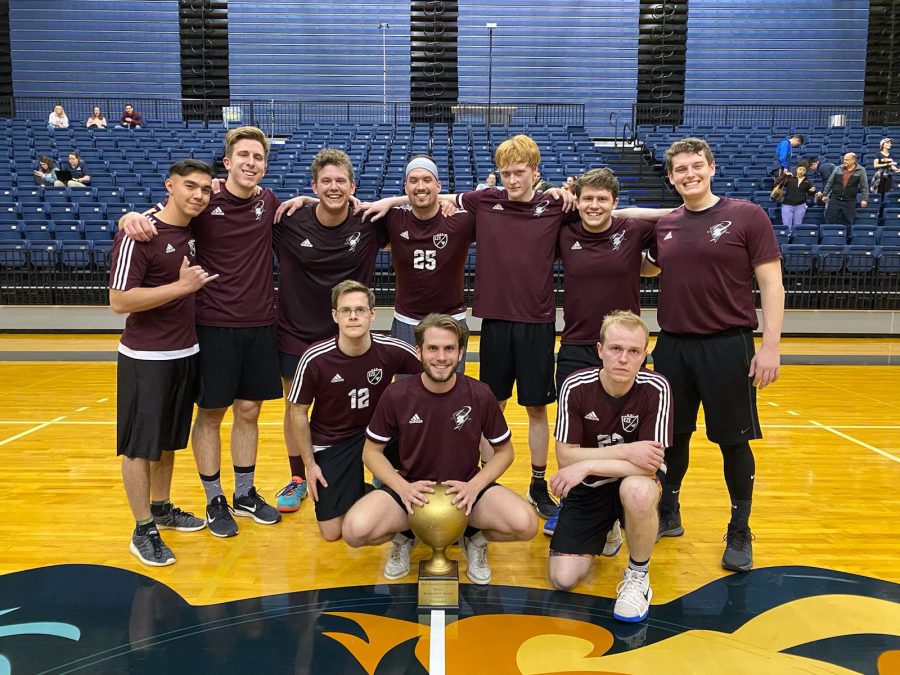This academic year, societies competed in 10 intramural sports, including soccer, volleyball and futsal, with 16 championship games completed and six more awaiting results.
In one of the most highly anticipated championships of the school year, Sigma Alpha Chi Spartans’ 11v11 soccer team, almost half of which were freshmen, won over the Pi Gamma Delta Royals in the 11v11 soccer championship at last semester’s annual Turkey Bowl.
In women’s intramural soccer, Pi Delta Chi Classics won the women’s championship tournament with Theta Delta Omicron Tigers winning the women’s recreational league soccer tournament. In volleyball, the Theta Sigma Chi Colts dominated in the women’s league while Phi Beta Chi Bulldogs took the men’s recreational league championship and the Spartans won the men’s championship league.
But beyond these classic sports societies have been participating in for years, the University added new intramural sports to the roster, including spikeball, pickleball, futsal and a co-ed sport for brother and sister societies, ultimate frisbee.
In the new intramural sports, Beta Epsilon Chi Cardinals won the women’s spikeball championship while Royals beat their rival Spartans in the men’s league. The Chi Alpha Pi Cavaliers took the championship title in men’s pickleball. The Colts took the women’s championship, making pickleball their second championship title of the academic year. The Tigers also earned a second championship title in flag football in addition to their win in recreational soccer.
The Beta Gamma Delta Patriots took two championships also: pickleball and futsal. Dodgeball saw Spartans coming in for their second win as well. Ultimate frisbee saw the Royals and Classics winning out over Cavaliers and Bandits. The basketball championship games ended Friday with Epsilon Zeta Chi Tornadoes taking the win for the men’s intramural championship and Nu Alpha Phi Flames taking home the trophy for the women’s championship.
Despite the success of the Classics’ intramural teams, Classics athletic director Hannah Stuhl said one of her goals was to help keep the sports as chill as possible. “I always emphasize the fact that you’re there to have fun,” Stuhl said.
Stuhl attributed the success of the Classics’ sports teams to the players. “They’re dedicated to what they signed up for,” Stuhl said. Another factor is the girls’ personal motivation. “People are always complaining about society, but it is what you make of it,” Stuhl said. “You don’t have to be the best sports player in order to get involved.”

Colts athletic director Caitlyn Benson saw her society’s volleyball team A take the championship while the Colts basketball team remains undefeated. “It was a really good season,” Benson said. “We killed it.” Benson said everybody on the volleyball team had previous experience, which contributed to the success of the A-team. She encouraged students to participate in society sports. “It’s really how you get to know people, because when you play sports with people you get to know them in a different way,” Benson said.
Director of the Center for Leadership Development Dr. Matthew Weathers helps oversee society sports. “I would just encourage students to participate,” Weathers said. “It’s not about how good or amazing anyone is at a given sport, it’s the opportunity to build relationships, strengthen the body that God’s given you and have a great time.”
Weathers said he believes society sports are important for several reasons. “It gives students an opportunity to form and strengthen relationships outside the classroom,” Weathers said. Weathers views sports as character building. “They can build relationships, which is a foundational purpose for societies themselves,” Weathers said. “Oftentimes when students are sweating, working, grunting and striving together, that bonds them together.”
Intramural sports are also helpful physically. “There’s countless research that shows physical activity helps you not just physically, but mentally, emotionally and I believe spiritually,” Weathers said. “When our bodies are moving, good things happen.”
While students now can participate in society sports regardless of talent, before Bob Jones University instituted intercollegiate sports in 2012 intramural sports were based on a competitive model. When intercollegiate sports were instituted, the University was able to switch intramurals from a competitive model to a recreational model. “All students [now] have an opportunity to recreate,” Weathers said.
This change in models allowed societies to have multiple teams. When societies are too small or there is not enough interest to form a team, members are able to become free agents and play on another society’s team. This has led to a rise of student participation in intramural sports from 965 students in the 2011-12 academic year to 1097 students in the 2019-20 academic year.























































